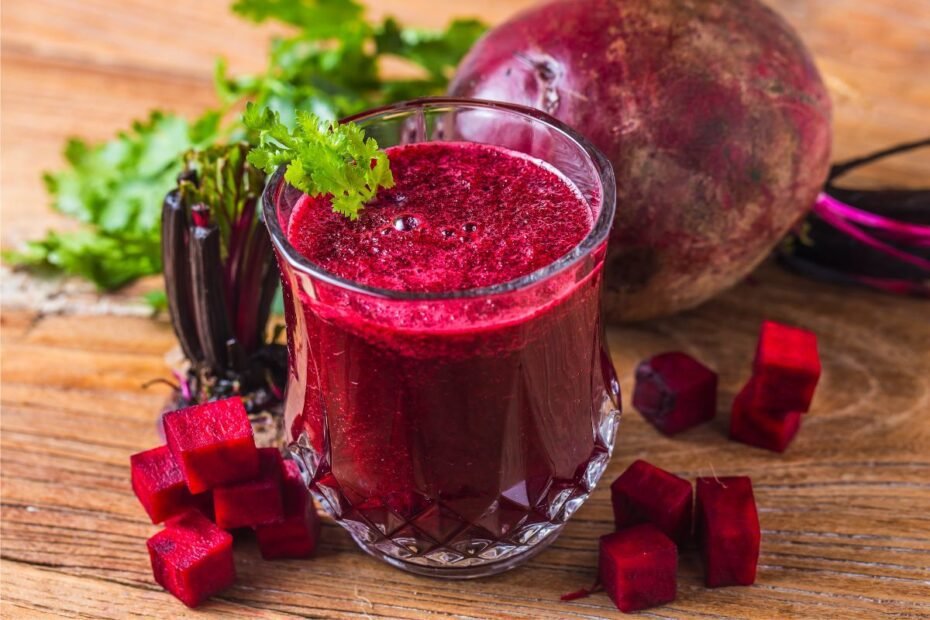Beets are a well-known and widely consumed vegetable, often considered one of the staple crops grown in our gardens for generations. As far back as the Middle Ages, people used beets to treat ailments, particularly those related to blood and digestion. You can enjoy these versatile vegetables fresh or preserved, making countless recipes for delicious dishes. One excellent option is fresh beetroot juice. This juice is an almost cost-free investment, which has invaluable benefits to your health. Read on and don’t wait—start preparing beetroot juice daily!
Beetroot Juice: A Nutrient Powerhouse
Beets are renowned for their highly valuable nutritional composition. They are abundant in vital vitamins, minerals, and antioxidants. Additionally, they contain unique bioactive compounds that offer diverse benefits for overall body function and specific systems.
A cup of fresh beetroot juice contains approximately 100 calories and 25 grams of carbohydrates. This makes it an excellent addition to a diet, providing essential nutrients without unnecessary calories.
Beetroot juice is an excellent source of calcium, iron, and potassium—key minerals vital for proper body function. Alongside, it contains vitamin C, vitamin A, folic acid, magnesium, manganese, phosphorus, sodium, zinc, copper, and selenium.
Incorporating beetroot juice into your daily routine may give your body a rich supply of nutrients that support overall well-being and vitality.
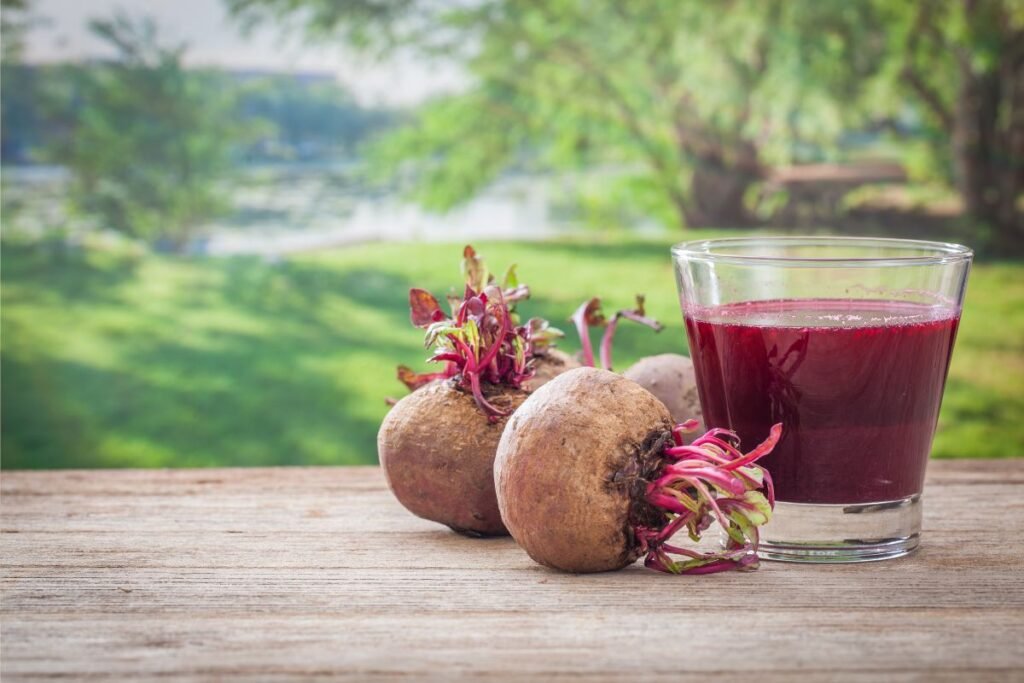
Where Lies the Power of Beetroot Juice?
As mentioned, beetroot juice is a drink packed with an impressive array of essential nutrients. This abundance of beneficial compounds provides ‘superpowers’ to beetroot juice. Let’s explore them in more detail:
- Zinc promotes wound healing and supports the immune system.
- Folic acid is crucial for DNA and cellular health.
- Phosphorus is necessary for the repair of teeth, bones, and cells.
- Iron ensures efficient oxygen transport by red blood cells.
- Calcium is vital for bone growth and strength.
- Magnesium supports the immune system, heart health, muscle function, and nerve health.
- Manganese plays a key role in managing metabolism and maintaining blood sugar levels.
- Copper aids in collagen production, essential for bones, blood vessels, and immune function.
- Vitamin B-6 supports metabolism and the production of red blood cells.
In summary, beetroot juice is a rich source of antioxidants, electrolytes, and nitrates. These natural compounds offer numerous health benefits and help maintain overall well-being.
8 Key Health Benefits of Beetroot Juice
Scientific research has demonstrated the health benefits of beetroot juice. Health experts highlight eight main areas where beetroot juice can have a positive impact:
- Lowering Blood Pressure. The nitrates convert to nitric oxide in the blood, which helps relax and widen blood vessels. A 2022 review of scientific studies found that nitrate from beetroot juice reduced systolic blood pressure in adults with hypertension.
- Improves Heart and Circulatory Health. Incorporating beetroot juice into your diet can strengthen the heart muscle and improve blood vessel elasticity, directly supporting a healthy circulatory system.
- Supports People with Heart Failure. A 2016 study found that beetroot juice improved exercise tolerance in older adults with heart failure. Drinking 70 ml (about one-third of a cup) daily for a week enhanced physical endurance by 24%.
- Reduces Inflammatory. Beetroot juice contains water-soluble antioxidants called betalains, anti-inflammatory compounds that give beets their deep red color. A 2015 review noted that betalains could help prevent inflammatory processes, while a 2014 study showed reduced inflammatory enzyme activity by 32%.
- Lowers the Risk of Cancer. The betalains in beets, combined with other flavonoids and polyphenols, possess robust antioxidant and anti-inflammatory properties, which may help reduce cancer risk.
- Aids Recovery After Chemotherapy. Scientific studies suggest that beetroot juice may mitigate the side effects of chemotherapy and help the body recover more quickly. However, more research is needed, particularly on interactions between beetroot juice and chemotherapeutic or other medications.
- Helps Prevent Anemia. Iron, essential for red blood cells to supply oxygen, can prevent or treat iron-deficiency anemia, with beetroot juice as a helpful remedy.
- Supports Healthy Liver Function. Antioxidants, vitamin A, vitamin B-6, and iron help protect the liver from inflammation and oxidative stress. These nutrients also enhance liver function and assist in breaking down and eliminating toxins from the body.
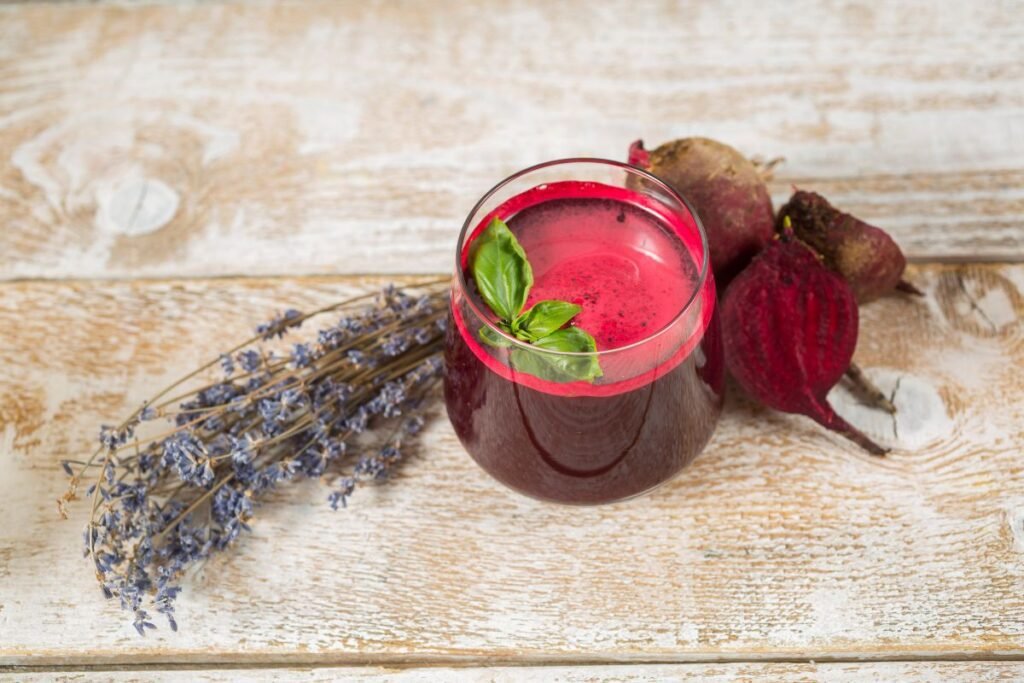
Beet Juice Boosts Athletes’ Endurance
The compounds found in beets—nitrates and betalains—play a significant role in enhancing athletic endurance. A 2017 scientific review indicated nitrates improve blood circulation, delivering more oxygen to muscles. This process is directly linked to better physical performance and increased stamina.
In a 2018 study, the effects of betalains were tested on 28 professional cyclists. Scientists divided participants into two groups, receiving 100 mg of beet concentrate or a placebo weekly. The results showed that cyclists who consumed beet concentrate experienced improved blood flow and longer exercise duration.
Freshly Pressed Beetroot Juice
Freshly pressed beetroot juice is simple to prepare at home. Natural, freshly made juice is the most valuable, especially if it is organic, homegrown beets.
To make beetroot juice, you can use either a juicer or a food processor:
Using a juicer: Peel and quarter the beets, then place them in the juicer. The device will separate the pulp from the juice, leaving you with a glass of pure beetroot juice.
Using a food processor: Blend chopped beets with water until smooth. Next, use cheesecloth to strain the mixture and extract the juice.
Drink beetroot juice immediately. If the taste of pure beet juice is too strong, chill it in the refrigerator before drinking. However, avoid storing fresh beet juice for long periods, as its flavor may change.
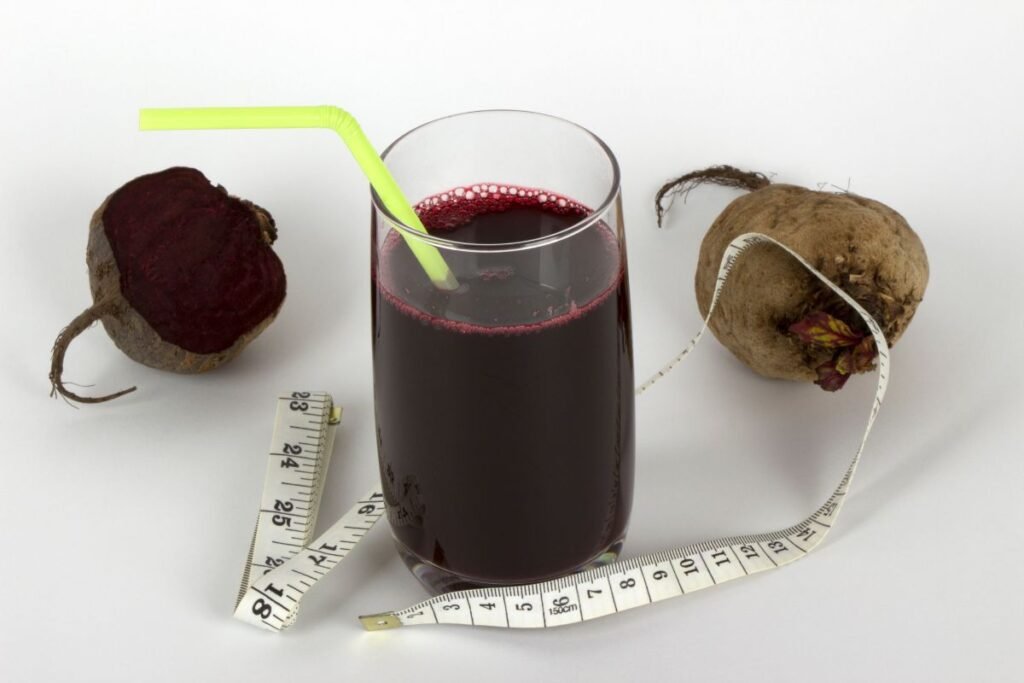
Fermented Beetroot Juice: A Natural Probiotic
A healthy gut is the foundation of overall health, and maintaining a balanced gut microbiota is key. Fermented beetroot juice—also known as beet kvass or probiotic beet drink—is a simple, natural, and affordable way to enrich your gut with beneficial bacteria.
Fermented beet juice has a tangy, slightly salty, and mildly sharp flavor, somewhat reminiscent of pickled cucumber or sauerkraut brine, though distinct.
Ingredients for fermented beetroot juice:
- Beets
- Fine sea salt
- Filtered water
Preparation Steps:
- Wash and chop two large beets into pieces. Do not peel them, as the skins contribute beneficial bacteria.
- Place the chopped beets in a clean 1-liter glass jar.
- Mix 3 cups of water with 1 tablespoon of sea salt.
- Pour the brine over the beets, ensuring the liquid covers them, leaving about 2.5 cm (1 inch) of space at the top of the jar.
- If you need more liquid, prepare additional brine using 1 teaspoon of salt per cup of water.
- Cover the jar with a loose-fitting lid or a cloth and place it in a cool, dark location.
- Check the jar weekly. Fermentation will take 1–2 weeks, during which you’ll notice bubbling. If white foam forms on the surface, skim it off.
- After 2 weeks, move the jar to the refrigerator to slow fermentation. The longer the juice ferments, the stronger the flavor will become.
- You can remove the beets before refrigeration or leave them in for extended use.
Additional Tips:
- To shorten fermentation time, add ¼ cup of whey or sauerkraut brine to the mixture.
- Adding the dill, bay leaves, garlic cloves, or other spices may enhance the flavor of fermented juice. Pickling spice blends with peppercorns, caraway seeds, and dill seeds work particularly well.
Enjoy this probiotic-rich drink to support your gut health and overall wellness!
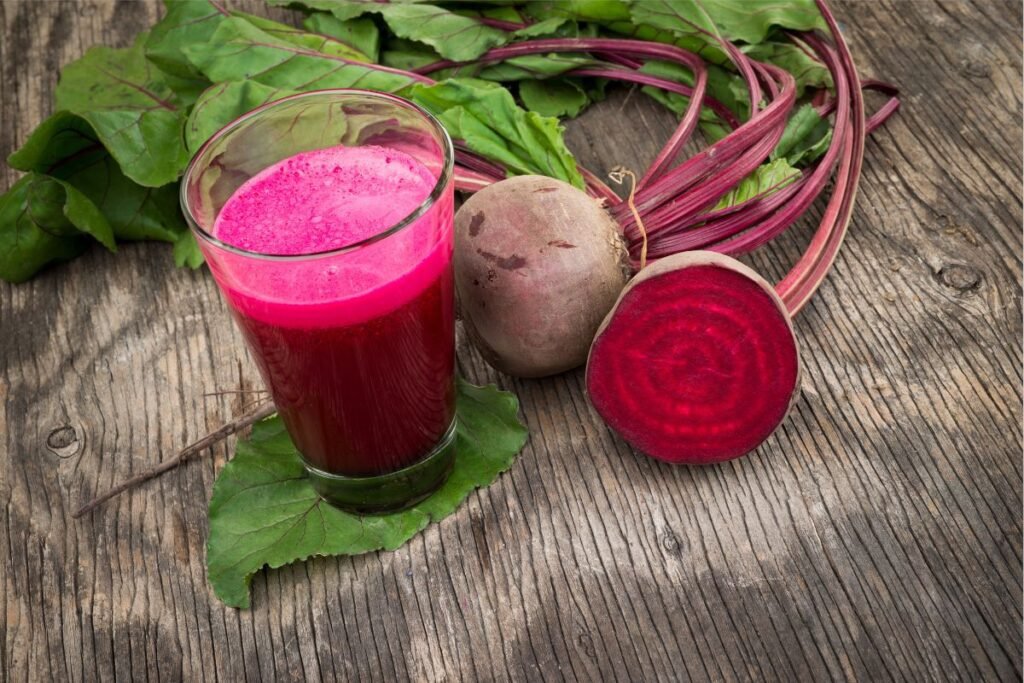
Recommendations for Consuming Beetroot Juice
Fresh beetroot juice has a sweet, earthy flavor with a metallic aftertaste, which many may not find appealing. Chilling the juice can improve its taste. Place freshly pressed juice in the refrigerator until it is well-chilled, and the flavor will be more pleasant.
If you dislike the taste of pure beetroot juice, you can mix it with other vegetable or fruit juices. Many suggest that the possibilities for blending beetroot juice are virtually endless.
Beet juice pairs well with orange, grapefruit, lemon, pineapple, mango, apple, and pear juices. It also complements carrot and tomato juices, cucumber, celery, spinach, ginger, turmeric, basil, parsley, mint, and more.
One glass of beetroot juice per day is sufficient for general well-being, disease prevention, and therapeutic purposes. Drink it in the morning or before intense physical activity.
Side Effects and Potential Risks of Beet Juice
Beetroot juice is safe for consumption by most people of all ages. The primary side effect of adding beets to your diet is a change in the color of urine and stool. The pigment in beets causes coloration, turning excreted materials reddish. This condition is harmless and resolves on its own.
However, there are certain cases where you should avoid beetroot juice or consume it only after consulting a doctor:
- Low blood pressure: If you have low blood pressure, avoid beet juice. It may increase the risk of critically low blood pressure.
- Kidney stones: If you suffer from or are prone to kidney stones, do not consume beetroot juice. Beets contain high levels of oxalates, natural compounds that can contribute to kidney stone formation.
- Chronic or oncological kidney diseases: People with these conditions should limit beetroot juice because of its high potassium content.
Sources:
- https://www.healthline.com/health/food-nutrition/beetroot-juice-benefits
- https://www.medicalnewstoday.com/articles/324898
- www.ais.gov.au/__data/assets/pdf_file/0005/1001102/Beetroot-juice-Infographic-2pg.pdf
- https://www.ncbi.nlm.nih.gov/pmc/articles/PMC6947971/
- https://www.ncbi.nlm.nih.gov/pmc/articles/PMC8565237/
- https://www.medicalnewstoday.com/articles/288229
Associative photos © Canva
